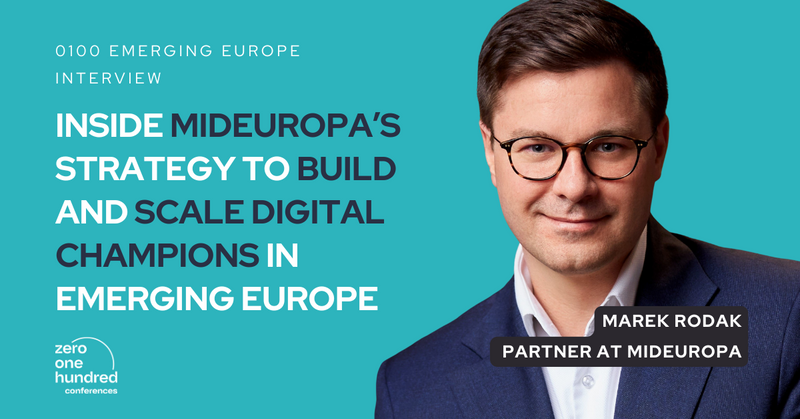Marek Rodak, Partner at MidEuropa, shares how the firm identifies and scales technology companies across Central and Eastern Europe by backing “digital champions”—tech-driven businesses with regional roots and global ambitions. In this exclusive interview, he explains why CEE is primed for digital innovation, how MidEuropa leverages consolidation strategies to create market leaders, and what emerging trends are shaping the future of tech investing in the region.

How would you define a Digital Champion, and what makes the CEE Region a place for these companies to emerge?
A Digital Champion is a company that leverages digital technologies and channels to drive scalable growth while delivering a compelling value proposition to customers. These digital-first businesses should ideally aim for cross-border scalability to mitigate the risks associated with region-specific disruptions.
The CEE region remains a key growth engine for Europe, demonstrating macroeconomic resilience through stable currency, moderating inflation, and a robust labour market. With such strong fundamentals, an abundance of skilled and internationally recognized tech talent, and a favourable cost structure, CEE offers fertile ground for the emergence of a dynamic tech ecosystem and high-growth digital champions.
MidEuropa has a strong track record in building digital champions across CEE. What key factors do you consider when identifying and investing in technology companies within this region?
MidEuropa has invested significantly in developing its digital investment capabilities. We believe the global adoption of digital and tech solutions will continue to accelerate as part of long-term megatrends. We actively seek CEE-originated companies that are directly exposed to these trends, as demonstrated by our investments in e.g. (i) intive – global digital engineering firm capitalizing on trends in digitalisation, nearshoring, data/AI, and cybersecurity, (ii) Symfonia – a leading CEE software provider benefiting from SME digitalisation and increasing SaaS adoption, or (iii) Allegro – the region’s leading e-commerce and fintech platform, which has scaled significantly on the back of the ongoing shift from offline to online channels.
While each case is unique, we consistently evaluate factors such as the strength of the management team, market positioning, product and technology quality, potential for organic and inorganic growth, and clear exit visibility within our investment horizon.
With the increasing trend of nearshoring in Poland and CEE, how is MidEuropa positioning itself to capitalize on this movement, and what opportunities do you foresee arising from it?
Nearshoring has emerged as a major theme in recent years and has gained further momentum currently in light of shifting global trade dynamics. CEE holds strategic importance for Europe due to its still cost-competitive labour market, deep talent pool, and expertise in areas such as manufacturing, IT services, and R&D outsourcing.
MidEuropa is actively investing in this space, with notable examples including Intive (a digital engineering & IT services provider) or Famar (a pharmaceutical CDMO). We see a robust pipeline of opportunities aligned with this trend and expect to increase our investment activity in this area over the coming years.
In a fragmented tech landscape, how does MidEuropa approach consolidation and scaling of its portfolio companies to create market leaders?
Inorganic growth has been a key value driver across nearly all of MidEuropa’s technology and digital investments. In many cases, M&A has proven highly accretive due to synergy potential and the long-term nature of R&D cycles. This is especially true in consolidation plays involving complementary products or solutions that integrate well, enabling cross- and up-selling opportunities and enhancing both revenue and cost efficiencies. We've seen this first-hand in our investments in Symfonia and Intive, both of which have been successfully scaled through M&A.
However, before pursuing a buy-and-build strategy, we always assess the potential for accelerated organic product development (e.g. Allegro), which can sometimes deliver even greater value. In most cases, sustainable growth results from a balanced combination of both organic and inorganic initiatives.
ESG considerations are becoming increasingly important in private equity. How does MidEuropa integrate ESG principles into its investment and value creation strategies, particularly in the tech sector?
At MidEuropa, we integrate ESG principles into our investment strategies by embedding ESG considerations throughout the investment lifecycle. This includes initial ESG screening, detailed due diligence, and post-acquisition materiality assessments before developing comprehensive sustainability strategies. We also continuously engage with our portfolio companies to monitor progress and support implementation.
In the tech sector, some areas we focus on include energy efficiency, decarbonisation, and diversity & inclusion. For example, Intive has adopted an ambitious carbon reduction roadmap, while Symfonia has launched a mentoring programme aimed at empowering young women in technology.
Looking ahead, what emerging trends or technologies in the CEE region will shape the future of tech investments, and how does it differ from the rest of Europe?
A pan-European trend, also evident in CEE, is the impact of demographic decline, leading to tighter labour markets. Reversing this will take time, so the immediate focus must be on improving labour productivity—with technology playing a central role. Whether through process automation, AI-driven optimisation, or robotics in manufacturing, these solutions will be critical. At MidEuropa, we are actively seeking companies that address these challenges and believe CEE-based firms are well-positioned to lead in this transformation.

